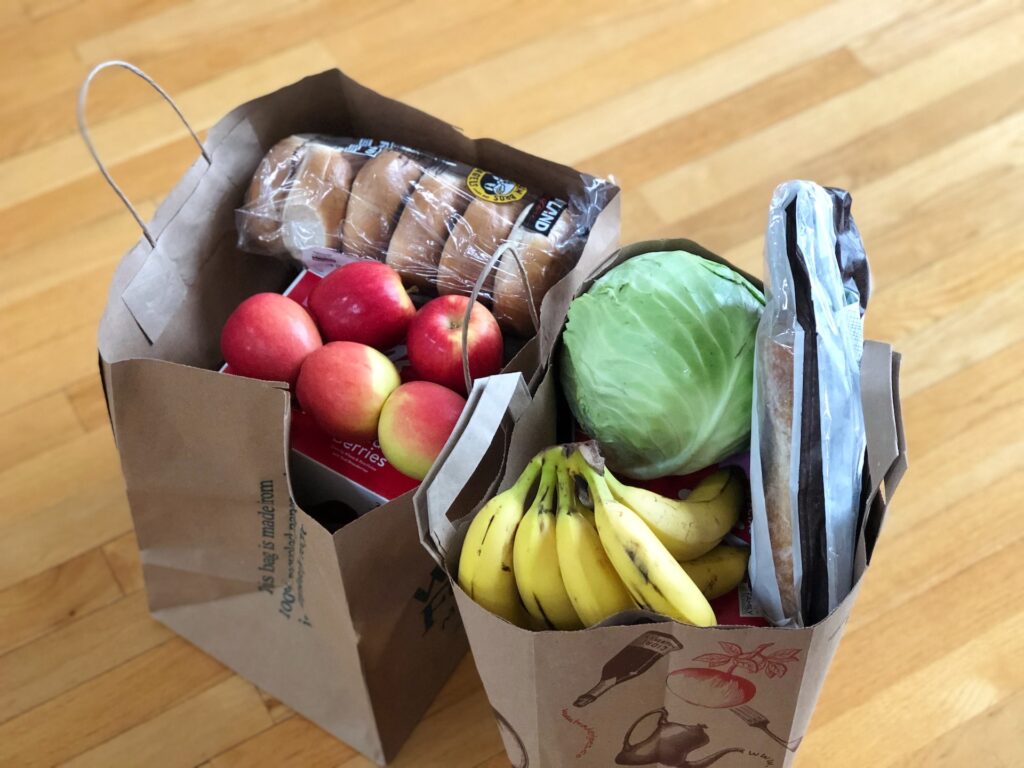Do you often eat breakfast and only have your next meal at 9 p.m.? Does your work schedule make you regularly change meal timing, so you unwillingly turn into an intermittent fasting fan? The weekends may bring more frequent meals, but then the story repeats come Monday. Such eating habits aren't good, especially if we want to lose weight, but let's see what we can do!
What's the most optimal meal frequency?
We often start thinking of our food intake when we face health issues or weight gain problems. Sometimes people have both, so healthy eating can differ for a person with type 2 diabetes versus one with fifteen extra pounds. Before answering how many meals are good for us, let's check the critical factors.
Health issues. Some conditions can dictate whether you, for instance, can skip breakfast or must have at least three meals a day. So consult a registered dietician if you have health issues like heart disease, type 2 diabetes, high total cholesterol level, etc. You shouldn't try to figure out a healthy eating approach on your own, as it's risky.
Distribution of calories. When you add two or three meals, considering the satiety of your food is inevitable. However, skipping breakfast of 300 calories and adding a high-calorie dinner won't work for weight loss. The total number of calories matter, but their distribution throughout the day is vital too. However, your lifestyle and eating habits can affect this distribution.
Synchronization of your meals with your circadian rhythm. Specialists closely link aligning your food intake with the natural sleep-wake cycle. So it's usually beneficial to have the most important meal between 10 a.m. and 2 p.m. That's when our metabolism reaches its peak, and most of us feel real hunger.
Food quality. Switching to a different meal frequency will make you also reconsider the quality of the products you consume. For example, more frequent eating involves adding more fruits and vegetables to your daily ration and excluding pastries and sugar, while reducing your food intake to two meals a day will require including more calories in each meal.
Snacks and drinks between meals. There are different approaches to what you can consume between your breakfast, lunch, and dinner. Some nutrition researchers are more strict and claim that you can only drink water during these pauses. Others recommend having only light snacks of 150-250 calories and drinking tea and coffee.
So, considering the factors above, you probably need to state the question more correctly: "What's the most optimal meal frequency for me?" Let's find the answer together!

Classic eating style with three meals a day
Since the lifestyle of many of us assumes having three meals a day, we'll start with this meal plan. Going to schools, universities, and work motivates us to eat breakfast early in the morning and have lunch during the break.
After a hard day, we're eager to praise ourselves with a tasty and relaxing dinner. For many, dinner is the most important meal as it allows family members to spend time together.
So, it's beneficial to have three square meals a day because:
You don't feel extremely hungry. Since you eat approximately every 4-5 hours, you have enough time to process food and feel true hunger again. Luckily, this eating pattern won't make you starve and think only about food when focusing on critical tasks.
Your digestive system works better. Regular meals help your body follow the daily meal plan and synchronize your digestive processes. This way, your eating patterns improve the work of your gastrointestinal tract and the assimilation of food.
You don't feel exhausted. Modern life is full of challenges, so it's beneficial to keep our energy level high enough to face them. Having three meals during your working day helps you stay effective, stress-resistant, and reliable.
You retain blood sugar control. Skipping meals can cause your blood glucose level to drop. For a healthy person, this can result in tiredness and poor concentration. But for people with type 2 diabetes, it's a risk factor, so they must have regular meals to retain blood sugar control.
However, you can come across certain difficulties while following the square meals diet:
You don't lose weight intensively. Regular workouts and decreasing the calories you consume promote weight loss. However, eating three meals a day may prevent you from losing weight quickly. To get slimmer, you'll need to have smaller meals and consume more healthy fats.
You become dependent on food. While eating regularly brings health benefits, some of us may become too reliant on food. So, if skipping breakfast can turn you into an irritated monster, it's probably time to consider intermittent fasting. This means that you will set non-eating hours during the day, which will decrease dependancy
Your digestive system doesn't have enough rest. Regular meals have plenty of advantages. Still, if you never change your eating schedule, your body may lack the ability to remove toxins. Sometimes, non-eating for longer periods can be positive for your health.

How to change your eating habits
You probably wouldn’t read this article if you had no desire to change your eating styles and principles. No matter which option you choose (having more small meals or having only one meal per day), the transformation won't be too easy. The recommendations below can help you manage the tough period of shifting to new eating patterns.
Start a food diary. Starting skipping meals or switching to early dinner isn't only a physical process. Food isn't just our fuel but a source of mental pleasure. That's why reducing the quantity of this enjoyment can become a challenging experience. Sharing your worries and thoughts while gaining healthy habits can help you get through this period.
Find like-minded people. Changing food habits is hard, but doing it together with someone is easier. Find communities with people who also try to opt-out of having three meals a day. You'll be able to get and give support to those who make their first steps in intermittent fasting or switching to 5-6 small meals.
Drink two liters of water. Changing your meal patterns shouldn't affect your water intake, especially if you have only one meal and experience a long fasting period each day. Water helps keep normal blood pressure, makes your skin look better, and lubricates your joints. Water doesn't only make you younger and healthier but also promotes weight loss.
Wait for three days. Starting is often tricky. When it's about changing habits, it's even harder. So once you switch to having small meals, cutting the volume of calories, or changing your meal frequency, you'll probably feel worse. However, give yourself three days before giving up the new plan, and you may notice positive changes that will encourage you!
Benefits of having less than three meals a day
Decreasing the meal frequency is problematic because it often means eating less. While you'll be managing the physical and mental resistance, these several benefits should support you:
You spend less on food products. Most of us spend a lot on food products, and grocery prices grow each year. Having smaller meals or reducing meal frequency will let you cut expenses on what you eat. The effect probably won't be immediate, but if you track each purchase in the supermarket, you'll notice a difference.
You can cook less. Some people enjoy crafting tasty dishes. But even they can get tired of cooking when it becomes a routine, so they'd love getting more free time due to fewer hours spent in the kitchen. Having less frequent meals will also generate fewer dishes to wash, giving you even more spare minutes.
You give your digestive system some rest. The three-meals eating pattern usually leaves our bodies around a 10-hour-long fasting window. That's the time when your stomach has no food to process. If you typically start eating breakfast at 7 a.m. and have your last meal at 7 p.m., your digestive system will pause its activity from 9 p.m. to 7 a.m.
You lose weight. When eating smaller portions, you consume fewer calories. Often, people consider skipping meals and intermittent fasting when they have extra pounds and want to focus on losing weight. Make sure to also focus on the health benefits of weight loss, like improved mobility and lower risk of heart diseases. At the same time, be sure to stay aware of the possible development of eating disorders due to intermittent fasting diets.
You can allow more food at a time. When you have less frequent meals, it can be stressful. This can cause some to feel like they aren’t allowed to enjoy food anymore. On the contrary, when switching to two meals a day, you need to split the food volume meant for three meals. It'll help you not feel left out at the beginning of your weight-loss journey. Soon, your portions will naturally decrease.
You won’t overeat. In the previous bullet, we mentioned that you can have the same daily quantity of food only during the first 2-3 days. That's because longer pauses between meals will make your stomach smaller. So eating as large meals as you do on a three-meals nutrition plan won't be possible.
You help your body remove toxins. When your body isn't busy processing food, it starts to heal itself. This way, your body eliminates toxins and stimulates cell division when your meal frequency drops. After a few days, you may notice that your skin becomes cleaner, your nails and hair become less breakable, and your eyes shine brighter.

Disadvantages of the first weeks of less frequent eating
Intermittent fasting with longer non-eating intervals has particular challenges. However, you'll be facing them only during the transition period. Some people will get used to new eating schedules faster, while others will find skipping meals really tough. Below are some uncomfortable experiences you might face while changing your meal plan:
You feel hungry. Though you can consume the same number of calories per day, your non-eating windows will be longer. This will make you feel more intense hunger during those intervals. However, this will last for the first few days. Soon your body will adapt to eating smaller portions and spending more hours without food.
You feel a lack of energy. The redistribution of meals and calories during the day will create time slots when you'll feel tired. A good way to manage this is to start decreasing the number of daily meals on weekends or even holidays. This way, you'll spend the most uncomfortable moments outside of work and minimize the impact on your commitments.
You become irritated. If you've tried diets to lose weight, you've encountered bad moods and irritation. That's because when you feel intense hunger, your hormones and glucose levels swing and provoke adverse reactions. Sometimes the intensity of these emotions can jeopardize incorporating intermittent fasting into your life.
You feel isolated. It definitely has health benefits when you try to consume fewer calories and skip eating breakfast or dinner. But along with that, your friends and family may not support you or even stop your weight-loss and healthy-eating intentions. Moreover, you'll notice that the tradition of having three meals a day is everywhere, so you may feel isolated.
Going down to two meals per day
The two-meal plan assumes you have a fasting period of 16 hours and an eating window of 8 hours. So people also call it 16:8, while a typical three-meal eating schedule would be 12:12. It means you skip one meal and add 4 hours to your fasting time.
This will probably be the easiest way to transform. It'll also help you lose weight, grow your energy, and reduce the feeling of hunger. People choose different time spans for consuming food depending on their lifestyles and preferences. Some prefer to eat breakfast as their most filling and important meal, starting their eating between 7 a.m. and 9 a.m.
Those who like to wake up later shift the eating window to noon or even 2 p.m., allowing them to have the largest meal in the evening. Though having dinner at 10 p.m. can perfectly fit your social or family life, this timing doesn't entirely coincide with the circadian rhythm.

Trying 23:1 intermittent fasting with one meal a day
The one-meal-a-day lifestyle is the most challenging of all eating plans, as it only leaves you one hour to consume food. That's why it's also called 23:1 intermittent fasting. Many people following this "diet" prefer to eat in the evenings. Still, some specialists insist that breakfast should be the only meal. We'd recommend listening to your body when identifying the best hour for this intermittent fasting.
Shifting to the 23:1 fasting from the three-meal plan can be too hard while going down from the 16:8 seems much more manageable. The toughest thing is that you won't be able to alternate the meal time, waiting for the whole day to eat. In return, such a schedule will streamline your weight loss.
But if you're a food lover who wants to lose extra pounds quickly, this approach can only harm your physical and mental health. For instance, you'll sacrificially starve for the whole day and binge-eat at the end of the day. This will be pretty stressful for your body, so mindful eating will be the best option.
Pros of eating more than three meals a day
There's another answer to the "How many meals a day will promote my weight loss?" question. Some dieticians state that five or six small meals with an adequate total number of calories will help you lose weight and improve your health. Let's check if this approach can work for you as it offers these benefits:
You can control your hunger. Some of the latest research proves that frequent meals themselves don't stimulate intensive fat burn, so you won't lose weight if you just split your three meals into six. But snacking every 2-3 hours will prevent you from feeling intense hunger. This way, you'll avoid getting into a bad mood and possibly having angry reactions.
Your energy level will be up all day long. Frequent meals help retain blood sugar control. This means you have fewer chances to feel tired throughout the day. This helps if you have prolonged working hours, if your job requires physical or mental endurance, or if you're a stay-at-home mom.
You have to add more fruits and vegetables. If you've always wanted to eat healthier food, you won't escape it when switching to six meals a day. That's the only way to balance your calories and prevent yourself from gaining weight. Fruits and vegetables are tasty, glucose-containing, and water-rich. Moreover, they give us vitamins that strengthen our immune system.
Cons of having frequent meals
There also are some pitfalls to eating smaller portions more frequently:
You may not notice how your portion size grows. At first, you'll be calculating calories and double-checking the weight of the products you consume. But with time, things may slowly get out of control, and you'll find yourself having the "most important meal'' six times a day. First, you'll excuse yourself because you'll be tired, then you'll be stressed, and later you'll be frustrated.
You'll need to stick to the schedule. Having five or six meals a day means you have to eat every 2-3 hours. But the rhythm of our lives is so intense that you'll probably need to set an alarm for each meal. Since this nutrition plan requires regularity, following the schedule is critical. This way you'll get positive results.
You'll have to plan meals. Six meals is quite a lot of food you’ll need to buy, cook, and pack. So allow some more time to think about what you'll eat for breakfast, lunch, dinner, and three snacks around them. Crafting a week's meal plan and choosing the day for going to a supermarket are essential to making this plan work.
You probably won't enjoy meals as much. There's the other side of not having intense hunger. Without it, you won't feel the pleasure of having a nice lunch or dinner. They say hunger is the best spice, and you've probably felt that food becomes ten times more delicious when you're hungry. But remember that eating is supposed to give us energy, and only after that does it bring pleasure.
Increasing meal frequency to four meals a day
Switching from three to four meals a day isn't only about adding one snack to your diet. To avoid consuming extra calories, you must reconsider what you eat. Incorporate more protein and fiber ingredients and minimize sugary beverages, fast food, sweets, and pastries.
This way, you'll have the same three but lighter versions of your breakfast, lunch, and dinner, plus one snack. Depending on your schedule, load, and preferences, the snack can go between a light breakfast and lunch. Or you can have a cup of tea with a couple of whole grain biscuits or a salad with avocado and chicken in the afternoon.
It would be better if you consumed all the calories earlier, but if you can't go to bed with an empty stomach, have a glass of milk or an apple before sleep. This isn't beneficial, but this nutrition plan sometimes allows you to change your snack time to adjust it to the current circumstances.
Switching to the five-times-a-day eating pattern
A five-meal nutrition pattern assumes that you eat approximately every three hours. That's a relatively frequent food intake, so make sure your portions are smaller and healthier. Decreasing the number of meals requires shifting gradually. However, you won't need to pass through the four-meals-a-day plan to shift from three to five meals a day.
Eating five times a day can look like a smaller breakfast, lunch, and dinner with two snacks in between. If you have the most important meal around 1 p.m., have your first snack mid-morning and the second mid-afternoon. Though you'll eat more often, smaller portions will soon cause your appetite to decrease.
Consuming less food at a time prevents overeating and helps you better understand your body's hunger signals. In addition, this approach will have a weight-loss effect and help your body remove more toxins. So you're supposed to be more energized, slimmer, and healthy after a couple of months of sticking to this eating pattern.
Having six small meals a day
Having six meals a day requires a highly responsible approach. Though nibbling every two hours is easy, you need to control the portion volume and eating schedule. Only with time will you be able to use your body clock instead. Moreover, you must craft the menu, purchase the necessary products, cook them, and pack your snacks if you leave home.
Your first meal will start around 7-8 a.m. It shouldn't exceed 300-350 calories if you limit yourself to 2,000 calories a day. For example, for breakfast, you can have whole wheat toast with ham or cheese, a hard-boiled egg, and a cup of coffee with milk. A banana, a glass of yogurt topped with berries, and several almonds will be great for your mid-morning snack.
Have some fried chicken fillets or grilled salmon with a vegetable salad. Add several non-fat crackers to make your lunch light but filling. Fruits for a mid-afternoon snack are ideal, while meat with vegetables will be perfect for your dinner. Your last meal should be super light, like a glass of milk with some cereal or a cup of unsweetened yogurt.

Healthy eating principles
Eating is supposed to supply energy to our bodies, but often it becomes medicine for stress and anxiety. Negative feelings can make us eat more unhealthy food and gain weight. However, intermittent fasting plans or eating smaller portions more often can help. Whether you prefer three or six meals a day, following these recommendations can help you.
Eat when you feel hungry. When you're hungry, your body’s ready to process incoming food quickly and effectively. Once you eat less than you want or don't eat at all, your body utilizes the extra fat. But if you eat without genuine hunger, you'll consume extra calories that will be stored inside.
Don't overeat. Overeating doesn't only result in extra pounds. It can break the balance of the generation of hormones that stimulate and suppress appetite. Chronic overeating can cause obesity and even affect your mental health. So stay aware while eating breakfast, lunch, dinner, or snacks.
Follow the schedule. If you eat at the same time every day, your body gets used to producing digestive juice. This allows it to process food more effectively and maximize the absorption of nutrients. Following the eating schedule is a challenge in our fast-paced lifestyles, but remember how healthy and rewarding it is.
Have your last meal two hours before going to sleep. You probably won't fall asleep without a substantial meal. However, you can feel heavy and experience disturbed sleep when you go to bed soon after a large meal. Moreover, you can gain weight by doing this, so try eating a couple of hours earlier to avoid these negative effects.
Manage your meal timing with Eleviate
Healthy eating is a lot about planning, and Eleviate is here to help you create and follow your nutrition pattern. Take a quiz to determine your personalized food intake plan and check the scheduling and care-delivery features of the app. Moreover, Eleviate will help you restore your mental health and return to a fulfilling life. Hundreds of people enjoy well-being with Eleviate, and you can do it too!





